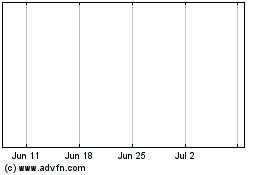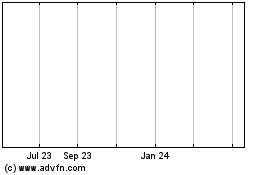AIG, Berkshire Hathaway Strike Reinsurance Pact -- Update
January 20 2017 - 12:26PM
Dow Jones News
By Leslie Scism and Nicole Friedman
American International Group Inc. said it would pay Warren
Buffett's Berkshire Hathaway Inc. roughly $10 billion as part of a
pact to make Berkshire responsible for covering some AIG claims if
they run unexpectedly high.
The reinsurance agreement is one of the largest ever such deals
in the property-casualty insurance industry, covering $34 billion
in AIG's U.S. liability-insurance reserves. Berkshire will be able
to invest the proceeds until the $10 billion is needed to pay
claims.
Berkshire has long relied on large reinsurance deals to generate
cash that it can use to invest, and Ajit Jain, Mr. Buffett's
longtime insurance lieutenant, has a reputation for taking on large
liabilities that others wouldn't consider.
In addition to insurers, Berkshire owns dozens of companies
including railroads and utilities and operates a large stock
portfolio.
While low reinsurance prices in recent years have pushed
Berkshire toward commercial insurance, the company continues to
take on some liabilities from its peers, especially asbestos
claims. AIG paid Berkshire about $1.65 billion in 2011 to shoulder
some of its asbestos obligations.
The AIG transaction is the latest move by the insurance
conglomerate to streamline its operations and improve results in
the face of pressure from billionaire investors Carl Icahn and John
Paulson. After publicly criticizing the company's approach in 2015,
Mr. Paulson and a lieutenant to Mr. Icahn joined AIG's board last
spring.
The pact with Berkshire covers just under half of the overall
property-casualty claims reserves on AIG's books as of last year.
AIG is betting that eventually claims will exceed $34 billion, the
amount it has set aside for payouts.
"The net result is a positive and decisive step that gives us
greater certainty and frees up additional risk capacity to serve
our clients and return capital to shareholders," AIG Chief
Executive Peter D. Hancock said in a memo to employees.
AIG, one of the biggest sellers of insurance by volume to
businesses around the globe, also said it expects a material
fourth-quarter charge to boost its claims reserves. AIG declined to
comment on the possible size. Its fourth-quarter earnings will be
released next month.
The move comes as the reinsurance industry is awash in capital
because pension plans and other yield-hungry investors have been
plowing money into "catastrophe bonds" and other alternative forms
of reinsurance. Few reinsurers, if any, have the scale to do a deal
of the AIG-Berkshire agreement.
The agreement with Berkshire's National Indemnity Co. requires
AIG to pay the first $25 billion of claims as they come due. It is
expected to be at least several years before Berkshire would begin
tapping the roughly $10 billion for its portion of responsibility.
The Berkshire unit will pay 80% of net losses and related
loss-adjustment expenses if more than the $25 billion is needed for
policyholders. Berkshire's exposure is capped at $20 billion.
Omaha-based National Indemnity, which Berkshire purchased in
1967 for $8.6 million, declined to comment.
In transferring the roughly $10 billion into a trust account,
AIG's investment portfolio will shrink by that amount. AIG
primarily invests in high-quality bonds, which currently are
yielding low-single-digits amounts.
AIG said it would retain sole authority to handle and resolve
claims, though National Indemnity has various access and
consultation rights, AIG said. The agreement will be accounted for
in the first quarter.
The pact covers such product lines as workers' compensation,
directors' and officers' liability, professional indemnity, medical
malpractice, commercial automobile and some other liability
policies.
Over time, the reinsurance agreement is expected to free up
capital that AIG has supporting part of its property-casualty
insurance business, helping it to continue to return capital to
shareholders. AIG declined to comment on the size of the possible
freed-up capital.
The transaction "fits like a glove within Berkshire's
reinsurance business model and will go a long way toward restoring
long-term stability to AIG's balance sheet," said Robert Hartwig, a
professor at the Darla Moore School of Business at the University
of South Carolina who specializes in insurance.
Write to Leslie Scism at leslie.scism@wsj.com and Nicole
Friedman at nicole.friedman@wsj.com
(END) Dow Jones Newswires
January 20, 2017 12:11 ET (17:11 GMT)
Copyright (c) 2017 Dow Jones & Company, Inc.
Berkshire Hathaway (NYSE:BRKA)
Historical Stock Chart
From Mar 2024 to Apr 2024

Berkshire Hathaway (NYSE:BRKA)
Historical Stock Chart
From Apr 2023 to Apr 2024
